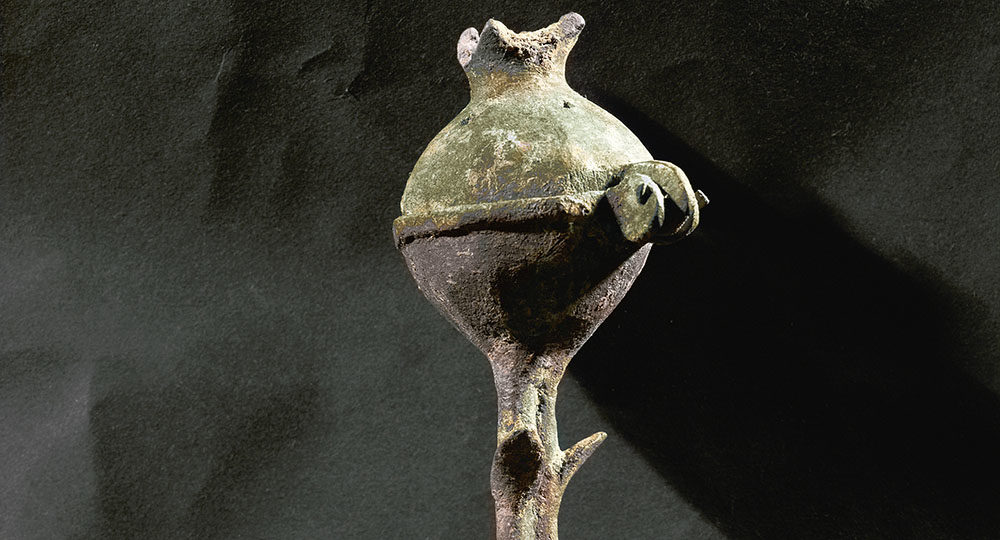Uzziah’s ‘Deadly’ Sin
History and literature often speak of the “seven deadly sins”: lust, gluttony, greed, sloth, wrath, envy, and pride. The Bible also lists seven sins and calls them “an abomination” to God: “a proud look, a lying tongue, hands that shed innocent blood, a heart that devises wicked plans, feet that are swift in running to evil, a false witness who speaks lies, and one who sows discord among brethren” (Prov. 6:16–19). Common to both lists is pride. It can infect believers and unbelievers alike, and it turned good King Uzziah into a leper.
Pride is defined as “having an excessively high opinion of oneself or one’s importance.”1 The Bible simply states, “Pride goes before destruction, and a haughty spirit before a fall” (16:18). Pride has shipwrecked many, even some who truly loved the Lord—like Uzziah, a king of Judah.
Uzziah (also called Azariah) was 16 when he became king, and he reigned for 52 years, doing “what was right in the sight of the Lᴏʀᴅ” (2 Ki. 15:2–3).
He “sought God…[and] God made him prosper. So his fame spread far and wide, for he was marvelously helped till he became strong” (2 Chr. 26:5, 15). Then “his heart was lifted up” with pride (v. 16).
Uzziah’s pride led to a transgression so grievous that even the priests became afraid and tried to stop it. For some unstated reason, Uzziah overstepped his authority and entered the Temple of the Most High God to offer incense on the altar. After somehow securing a censer, the king quickly crossed into a priestly area of service that was strictly forbidden him by the Mosaic Law.
So often during times of tremendous blessing, conceit rears its head. It appears Uzziah forgot God’s restrictions and began relying on his own strength. Pride can often make a person careless, egotistical, and bold.
God had set up specific areas of responsibility and service. And it was against His Law for someone to trespass into an area that was not assigned to him. Uzziah’s trespass was particularly bad because he merged two offices that were never to be combined: king and priest.
Ancient Israel had three anointed offices: prophet, priest, and king. The word anoint simply implies being set apart for special service. Each anointed office had specific responsibilities under the Law. Prophets declared God’s Word to the people; they faced the nation and declared, “Thus saith the Lord!”
Priests faced the Lord for the nation. As the people heard a prophet’s message from God, their hearts were to become broken and repentant. Their brokenness and sorrow were communicated to God through the priests. The priests were responsible for the sacrifices, offerings, festivals, and the Temple itself.
The king was God’s ruler. He was to “write for himself” a copy of God’s Law, “that his heart may not be lifted above his brethren,” and was to rule under God’s authority (Dt. 17:18, 20).
These three anointed offices were never to be united in one person. A man could be a priest and prophet, as Samuel was. Or he could be a king and prophet, as David was. But the offices of priest and king were to remain separate.
The king held temporal authority; the priest had spiritual authority. To unite those offices in a sinful human being would have given that individual absolute control over the nation. Only one person will ever unite those two offices; and He actually will unite all three. Jesus, the sinless Messiah of Israel, will be Prophet, Priest, and King.
As soon as Uzziah crossed the line of his God-given authority, “Azariah the priest went in after him, and with him were eighty priests of the Lᴏʀᴅ—valiant men. And they withstood King Uzziah, and said to him, ‘It is not for you, Uzziah, to burn incense to the Lᴏʀᴅ, but for the priests….Get out of the sanctuary, for you have trespassed!’” (2 Chr. 26:17–18).
The Bible declares, “Then Uzziah became furious….And while he was angry with the priests, leprosy broke out on his forehead” (v. 19). Right there in the Temple, God judged him.
So they thrust him out of that place [the Temple]. Indeed he also hurried to get out, because the Lᴏʀᴅ had struck him. King Uzziah was a leper until the day of his death. He dwelt in an isolated house, because he was a leper; for he was cut off from the house of the Lᴏʀᴅ (vv. 20–21).
Often people feel led to do something for God. But in our enthusiasm we must still remember that God will never encourage anyone to do anything contrary to His Word. Uzziah may have felt led to offer incense, but it was not the Lord leading him.
Pride can take us down a lonely road. The Bible admonishes us to shun pride and to remember always, “Let him who thinks he stands take heed lest he fall” (1 Cor. 10:12).
ENDNOTE
- Oxford American Dictionary, version 1.0.2, © 2005 Apple Computer, s.v. “pride.”








Thank you for you succinct and biblical explanation. I needed to understand this as I read Mesu Andrews historical novel “Love in a Broken Vessel”…..
Just came across this and with your permission would like to provide this content to my Adult Sunday School class to reenforce or study of Isaiah ( currently we are reviewing 2 Chr, 2Kgs and Isaiah Chapter 1 as a discussion of Uzziah’s life and conduct. Thank you for this timely message.
Jeff
Good Morning Jeff,
Thank you so much for reading Israel My Glory, and for your very encouraging message, Please feel free to use this article for your class. If you would like to print it out, please feel free to make copies available. If any in you class would like to subscribe to Israel My Glory just let us have their addresses (either snail mail for hard copy or email for online) and we will be honored to provide them a free year.
Thank you so much for making my snowy Monday morning very bright.
Maranatha,
Tom